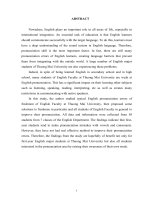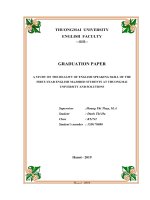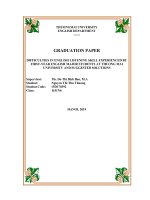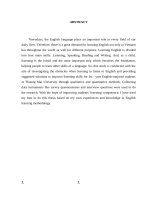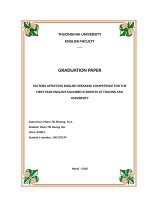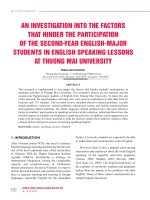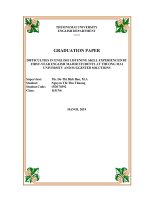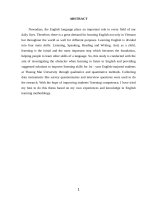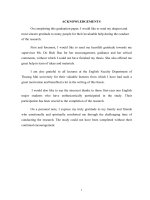Difficulties in english listening skill expperienced by first year english major students at thuong mai university and suggested solutions
Bạn đang xem bản rút gọn của tài liệu. Xem và tải ngay bản đầy đủ của tài liệu tại đây (448.48 KB, 49 trang )
THUONGMAI UNIVERSITY
ENGLISH DEPARTMENT
------
GRADUATION PAPER
DIFFICULTIES IN ENGLISH LISTENING SKILL EXPERIENCED BY
FIRST-YEAR ENGLISH MAJOR STUDENTS AT THUONG MAI
UNIVERSITY AND SUGGESTED SOLUTIONS
Supervisor:
Student:
Student Code:
Class:
Ms. Do Thi Bich Bao, M.A
Nguyen Thi Thu Thuong
15D170392
K51N6
HANOI, 2019
ACKNOWLEDGEMENTS
On completing this graduation paper, I would like to send my deepest and most
sincere gratitude to many people for their invaluable help during the conduct of the
research.
First and foremost, I would like to send my heartfelt gratitude towards my
supervisor Ms. Do Thi Bich Dao for her constructive and timely feedbacks as well as
her constant and unfailing support which were decisive factors to the completion of the
study.
HÀ NỘI
- 2015
Furthermore, I would love to thank
all the
teachers who have taught me academic
writing and research methodology. I would also like to say the sincerest thanks to those
first-year English major students who have enthusiastically participated in the study.
Their participation has been crucial to the completion of the research.
On a personal note, I express my truly gratitude to my family and friends who
emotionally and spiritually comforted me through the challenging time of conducting
the research. The study could not have been completed without their continual
encouragement.
ABSTRACT
Today, the position of English in the areas of life is increasingly important and
necessary. In order to learn English well and fluently, learners must improve their
language skills. Listening which can be regarded is the most difficult skill in learning
foreign languages in general and English in particular, is the skill that learners face
many difficulties and challenges. Students at Thuong Mai University also face many
difficulties in English listening. There are many domestic and foreign authors studying
the areas of listening skill. However, there has not been any specific study aimed at
first-year English major students of TMU. Therefore, the researcher conducts a study
on difficulties in English listening skill experienced by first-year English major
students. This thesis focuses on three main issues: the attitudes of first-year English
major students at TMU toward English listenning skill; difficulties in English listening
skill experienced by first-year English major students at TMU and suggested solutions
to help freshman at Thuongmai University improve their listening skill. This study is
conducted based on quantitative methods. Survey questionnaires were used to
distribute 100 students in classes (K54N1, K54N2, K54N3, K54N4) to collect data.
Raw data was converted to numbers and percentages. From the results obtained, there
were conclusions drawn about students' attitudes and their difficulties in English
listening skill. In general, freshmen were aware of the importance of listening skill and
most of them valued this as the most difficult skill in English skills. First-year students
face many difficulties in listening (subjective difficulties and objective difficulties).
From the research findings, the researcher offerred suggestions and recommendations
to help students solve difficulties in listening to English. The researcher hopes this
study can help first-year students improve their listening skill and support the further
studies avoid shortcomings and limitations.
TABLE OF CONTENTS
ACKNOWLEDGEMENTS.....................................................................................ii
ABSTRACT............................................................................................................. iii
TABLE OF CONTENTS........................................................................................iv
LIST OF TABLES, FIGURES, AND ABBREVIATIONS....................................vi
CHAPTER I: OVERVIEW OF THE STUDY.......................................................1
1.1.
Rationale of the study...............................................................................1
1.2.
Previous studies........................................................................................3
1.3.
Aims of the study......................................................................................6
1.4.
Research subjects......................................................................................7
1.5.
Scope of the study.....................................................................................7
1.6.
Research methodology.............................................................................8
1.7. Organization of the study....................................................................................8
CHAPTER 2: LITERATURE REVIEW..............................................................10
2.1. English listening skill.......................................................................................10
2.1.1. Definition of listening...................................................................................10
2.1.2. The importance of listening skill in language learning..............................12
2.1.3. Listening process..........................................................................................13
2.2. Difficulties in English listening skill...............................................................15
2.2.1. Subjective difficulties...................................................................................15
2.2.2. Objective difficulties.....................................................................................18
CHAPTER 3: RESEARCH FINDINGS...............................................................20
3.1. Students’ participation........................................................................................20
3.2. First-year English major students’ attitudes toward English listening skill
................................................................................................................................. 23
3.2.1. Students’ attitudes toward the level of importance of English listening skill23
3.2.2. Students’ attitudes toward the level of difficulty of English listening skill
................................................................................................................................. 24
3.2.3. Students’ attitudes toward listening self-study...........................................24
3.2.4. The way students listen for the first time....................................................26
3.3. First-year English major students’ difficulties in English listening learning
................................................................................................................................. 27
3.3.1. Subjecitve difficulties........................................................................................27
3.3.2. Objective difficulties.....................................................................................28
CHAPTER IV: RECOMMENDATIONS AND SUGGESTIONS......................32
4.1. Recommendations...........................................................................................32
4.1.1. For students..................................................................................................32
4.1.2. For teachers..................................................................................................34
4.2. Suggestions for further studies.......................................................................35
CONCLUSION
REFERENCES
APPENDIX
LIST OF TABLES, FIGURES, AND ABBREVIATIONS
TABLES
Table 3.1: Number of students participated in the survey.........................................20
Table 3.2: The day students spent on self-studying English listening in a week.......25
Table 3.3: Students’ difficulties in self-study English listening................................27
Table 3.4: Objective difficulties in English listening................................................28
Table 3.5: Some language barriers obstructing students' English listening skill.......29
Table 3.6: Students’ solutions to improve English listening skill.............................30
FIGURES
Figure 3.1: The distribution of participants by numbers of years they have been
learning English.......................................................................................................21
Figure 3.2: The distribution of participants by the level of the listening test scores. 22
Figure 3.3: Students’ attitudes toward the level of impotance of English listening skill. .23
Figure 3.4: Students’ attitudes toward the level of difficulty of English listening skill
24
Figure 3.5: The time students spend on self-studying English listening in a day.....25
Figure 3.6: The disparities in how students listen for the first time..........................26
ABBREVIATIONS
TMU: Thuong Mai University
CHAPTER I: OVERVIEW OF THE STUDY
The first chapter includes an overview of the research topic. The first problem
mentioned is the reason for studying the topic as well as previous research and the
aims of the study. In addition, Chapter I also points out the salient features of the
research subjects and scope of the study. Moreover, this is also the chapter outlining
the research methodology used in the study process. Finally, this chapter is also a
chapter that summarizes the parts of the organization of the study.
1.1. Rationale of the study
Today, the influence of English on the world is extremely important. English is an
important and necessary language in all areas of life such as: Economy, Education,
Technology, Diplomacy, Defense, etc. Therefore, the universalization of English for
Vietnamese people is extremely necessary. However, the proficiency of using a foreign
languag e is extremely difficult and time consuming. Vietnamese people need an
appropriate and advanced training program, and with an effort to reach the world, they
can quickly use the world's common language in the period of 4.0 Technology.
When starting to learn a new language, most people will learn to listen first. Like
the mother tongue learning process, humans all followed the voice of an adult when
they were young, and then start babbling. When a child hears the tone of an adult, he
can feel the emotions of adults like: angry, happy, shouting or cheering, etc. After that,
they hear how adults communicate with each other by saying words and learn how to
follow. That is why people bring the characteristic voice of the land they were born.
After going to school, children can learn to read and write. Therefore, listening practice
is extremely important in learning foreign languages in general and English in
particular.
Listening is an extremely important and difficult skill to practice. Therefore, there
are many research papers on the factors affecting this skill or the difficulties of learners
when listening to English. However, my study focuses on studying the listening skill of
1
first-year English major students at Thuong Mai University. There are many reasons
for me to do research on this topic.
The first reason comes from the reality of English listening skill of first-year
major students who are quite weak at this skill. Most freshmens were so familiar with
the high school curriculum. They only focus on learning grammar and vocabulary, but
are less interested in practicing language skills like practicing listening English. The
scores in the listening skill tests at the university are extremely low. Most freshmens
are afraid to learn to listen or listen to tests. Besides, according to Lewis (1993),
listening is also the most crucial medium for input in learning a foreign language and
by increasing students’ ability to perceive speech and thus aiding language learning.
Indeed, listening is an important and difficult skill. When learning a foreign language,
listening is a skill not to be missed. Listening skill plays a critical role in the remaining
other skills such as speaking, reading and writing. All skills are interrelated and used in
conjunction with each other in everyday life. Most learners will find their listening skill
difficult and choose to avoid having to listen to English. However, when being a
student in English department, first-year students need to raise awareness of the
importance of listening skills and try to overcome difficulties. Unlike students of other
faculties, students in the English Faculty need to be aware of the relationship of
listening skill with others, learners should not focus on a certain skill that you find it
easy for yourself and ignore other skills. Therefore, I want to thoroughly understand
the difficulties that new students are having then find the right solutions to help
freshmens to improve their listening skill.
The second reason that the researcher decided to study this topic was that when
being a freshman, the reseacher also had many difficulties in practicing English
listening. It was the fact that my first year listening test scores were not as expected. I
used to feel frustrated when I heard it because even though I tried, the results did not
improve. Like other students, I want to improve my listening skill to use specialized
English fluently after graduation. Ofcouse, learners need a lot of effort. The first year is
2
a good time for learners to improve their limitations, especially in listening skill.
Freshmen have a lot of time and opportunities to research and improve their skills.
Therefore, the researcher wants to through this study, can find out the difficulties that
freshmen are facing, and offer practical solutions for themselves. The researcher hopes
the results of this study bring benefits not only for the researcher but also the first-year
students who are weak in English listening skill.
Moreover, there have been many researches on listening skill of TMU students,
but very few people have studied specifically about difficulties in listening skill that
first-year English students have experienced. Therefore, I have more motivation to be
addicted to the research on this topic to help students in English Department.
These are the main rationales that promt the researcher to carry out the study of
topic “Difficulties in English listening skill expperienced by first-year English major
students at Thuong Mai University and suggested solutions”.
1.2. Previous studies
Before carrying out this topic, the researcher consulted and explored many
documents related to the topic of difficulties in English listening skill. There is a lot of
information and materials related to this issue on the internet, books, newspapers,
magazines, scientific papers, etc. In the references, the researcher found that the
research results and information in the following three authors’ language studies are
relevant and useful for the research, they are: The Role of Listening in Language
Acquisition; the Challenges & Strategies in Teaching Listening (D. Renukadevi, 2014);
Factors Affecting Listening Comprehension and Strategies for Improvement (Naci
Yildiz and Mustafa Albay, 2015) and Learners’ Listening Comprehension Difficulties
in English Language Learning (Abbas Pourhosein Gilakjani and Narjes Banou Sabour,
2016).
The first previous study that the researcher refers to is “The Role of Listening in
Language Acquisition; the Challenges & Strategies in Teaching Listening” (D.
Renukadevi, 2014). D. Renukadevi was an Assistant Professor of Department of
3
English in Erode Sengunthar Engineering College. His study deals with the prime
importance of listening in language acquisition and the challenges in attaining listening
competence and suggests some strategies to overcome it. D. Renukadevi declared that
“without listening skills, language learning is impossible”. The reason was “there is no
communication where there is no human interaction”. According to him, listening was
crucial not only in language learning but also for learning other subjects. Today,
learners have problems with listening with all the technological advancements in the
field of education. The study showed main reasons such as: learners spend too little
time to improve their listening skills; the inappropriate strategies tested on them in a
learning setting may be an important reason for their poor listening comprehension.
Other causes may from the listening material and physical settings. D. Renukadevi also
suggested some solutions to help langguage learners acquire high level listening skill,
such as:
Reduce the burden of comprehension by knowing the context of a listening text
and the purpose for listening greatly.
Both bottom-up processers (linguistic knowledge) and top-down processes
(prior knowledge) can be used by listeners to comprehend.
Teachers should play an important role in teaching learners strategies and how
to apply them into the listening task.
Students should be helped to develop sound strategies for comprehension
through a process approach to teach listening.
The second study that was referrd by the researcher is “Factors Affecting
Listening Comprehension and Strategies for Improvement” (Naci Yildiz and Mustafa
Albay, 2015). Their study showed three main factors from: listeners, speakers, material
and medium. The first factor was the intelligence of the learners which decided on how
much language input they receive. Background knowledge about the topic, another
factor, enables the learners to comprehend the listening text better; in other words prior
knowledge facilitates comprehension and allows learners to make predictions. The
4
second factor was speaker factors. They showed clearly factors from the speakers:
Speakers’ ability plays an important role in comprehension. Learners may
prefer listening activities of native speakers because it can help learners understand
better.
The pronunciation and accent of the speaker influences comprehension.
Delivery speed of the speaker is a major factor in listening comprehension.
Listening to well-known and prestigious speakers can motivate learners.
The other fators came from material and medium, such as:
The choice of listening materials holds a big role in comprehension. If
message is not conveyed, the materials will not be useful. Vocabulary, grammar level
and phonological of the material influences comprehension largely.
Stress and intonation in the material.
The content of the material
The listening environment.
In the study, they suggested many solutions to help learners improve listening
skill. They affirmed that all grammatical structures and vocabulary in listening texts
must be ensured to be taught beforehand. The difficulty of listening texts must be at
learners’ level of understanding and listening texts must absorb attention of learners.
Interesting listening topics motivated learners which finally lead to achievement. Speed
of delivery must be slightly slower than normal speech. The accent of speakers in
listening texts influence comprehension so native accents should be preferred. And
finally a silent and motivating listening environment should be created.
The third study that the researcher would like to review is “Learners’ Listening
Comprehension Difficulties in English Language Learning” (Abbas Pourhosein
Gilakjani and Narjes Banou Sabour, 2016). In this study, the researchers reviewed the
terms of listening, listening comprehension, listening comprehension strategies, and
listening difficulties. The researchers showed 3 listening comprehension strategies.
They are cognitive, metacognitive, and socio-affective. They also showed main
5
problems that learners faced with listening comprehension: The quality of listening
material, cultural differences, accents, unfamiliar vocabulary, length and listening
speed. The highlight of this study is that the author pointed out a lot of measures to
help students improve their listening skill. However, most of measures were applied to
teachers, such as: design listening tasks that arouse students’ interest and help them
learn listening skills and strategies; provide students with different types of input like
lectures, radio news, films, announcements, everyday conversation, and interviews;
familiarize students with the rules of pronunciation in order to help them hear the
different forms of rapid natural speech and ask them to imitate native speakers’
pronunciation; provide background knowledge and linguistic knowledge to students
while listening to different listening materials, etc.
From these two studies together with the graduation thesis on listening skill of
students at the Thuong Mai University’s library, I found that previous studies have also
clearly and specifically shown the reallity and limited points in students' listening skill.
But few studies focus on freshmen in English Faculty. Also study of English listening
skill, I would like to consult previous studies to clarify my topic more and gain the
experience from the previous researchers. I want to clarify the problem of listening
skill that students have to face. In this study, the object the researcher aimed at is the
freshman of English Faculty.
1.3. Aims of the study
This study focuses on understanding the difficulties faced by first-year English
major students at TMU and thereby proposing suggested solutions. More specifically,
this study is considered a process to explore the answers to the following questionares:
What are the attitudes of first-year English major students at Thuongmai
University toward English listenning skills?
What are difficulties in English listening skill experienced by first-year
English major students at Thuong Mai University?
What are some suggested solutions to help freshman at Thuongmai
University improve their listening skill?
6
1.4. Research subjects
Research subjects are freshmen, currently studying at the Faculty of English of
TMU. Most freshmen are students with the lowest English listening test scores in the
Faculty. They are almost familiar with the way they studied in high school. Before
going to college, high school students only focus on learning grammar and vocabulary
without taking time to practice language skills, especially listening practice in
particular. The goal of high school students is to achieve a high score on the university
exam. However, when they are in college, they must use the language they learn,
namely speaking and listening to English. Due to unfamiliarity with the environment
and the method of studying at the university, freshman students may face many
difficulties when listening to English.
Currently, according to the innovation program, freshmen have learned 4 skills:
listening, speacking, reading and writing as a separate subject. They have specific
subject to learn to listen to English. Compared to previous courses, freshmen have
better listening conditions, more time to listen with teachers and friends. Besides, they
also have the opportunity to learn how to listen to foreign teachers. However, this is
also a difficulty for most freshmen. English listening scores are considered a subject of
a subject, so low results will affect the overall outcome of the study. Especially, the
students from rural areas students from rural areas may face with much more
difficulties than other urban students because of diffcult economic conditions as well as
diferent education programs in which rural students have less opportunity to expose to
the target language and native teachers.
Therefore, listening to English and achieving high scores in university subjects is
really a big challenge for them.
1.5. Scope of the study
Firstly, the scope of the study is the difficulties in English listening skill
experienced by first-year English major students at TMU. The study focuses on
understanding and investigating the difficulties students face. The study does not intend
7
to explore other aspects of learning English, such as: factors affecting English listening
or students' English learning habits, etc. In addition, this research focuses on studying a
unique skill of learning English that is listening skill. The researcher did not study
about other skills such as speaking, reading and writing.
Secondly, due to time and ability limitations, the researcher only concentrated on
the first-year student of TMU's English Department. First-year students must be
students of the English Department, not other departments such as Marketing or
Accounting, etc. The research objects are limited and zoned. The scope of the study is
100 students randomly selected in 4 classes K54N1, K54N2, K54N3 and K54N4. The
researcher will invite participants to fill up the survey questionnaire from each of these
mentioned classes. The thesis did not study or interview other subjects such as teachers
or parents.
1.6. Research methodology
The research methodology used is quantitative method. The researcher designed a
questionnaire consisting of smaller and more specific questions. These questions
include closed questions (questions are available with answers). These closed questions
will be divided into 3 major parts (from part II to part IV). Part II contains 05
questions, understanding the attitude of students with learning to listen; Part III
includes 03 questions, find out about difficulties encountered by students, Part IV
includes 06 questions about the method of application to improve listening skill. The
researcher included questionnaires for 100 students who were selected in the scope of
the study, then retrieved the questionnaires for results. Results are transferred to
specific number data and the data are clearly analyzed.
1.7. Organization of the study
The rest of this paper has four more chapters:
In chapter two (Literature review): the researcher discusses the literature and
theory related to the research topic.
In chapter three (Research findings): the researcher has justified and described the
8
research method in full detail. From the results obtained after the actual survey, the
researcher has drawn new findings and made comments and evaluations on the survey
results.
In chapter four (Recommendations and suggestion): From the actual results
obtained, the researcher offers practical and specific solutions to the topic.
Final part is the conclusion for the whole study.
9
CHAPTER 2: LITERATURE REVIEW
The second chapter presents relevant theories ralated to listening and difficulties
in English listening skill. The definition or explaination of key terms in the topic is
presented along with the same previous research topics.
2.1. English listening skill
2.1.1. Definition of listening
Listening is one of the most difficult skills when beginning to learn a language, it
was claimed as “the most difficult of the four skills the beginner of a foreign language
has to develop” (Eastman, 1991). Listening is an extremely difficult and necessary
skill, but in Vietnam, since the beginning of English training, listening skill has not
been focused in training programs at primary and secondary schools. Until recent
years, the importance of listening skill has been pushed higher. In order to use a second
language fluently and smoothly, listening skill need to be combined with other skills.
There have been many authors and experts when studying the listening learning
that have taken different definitions of listening. In general, the concepts given by
experts have similarities, and help readers differentiate between “listening” and
“hearing”. It is remarkable that there is a clear distinction between hearing something
and listening to it. Hearing is simply a sound or word recognition while listening
implies some conscious attention to the message conveying the meaning of what is
said. According to Emmert (1994), “listening is more than merely hearing words.
Listening is an active process by which students receive, construct meaning from, and
respond to spoken and or nonverbal message”. As mentioned in Nunan (2003, p.24)
“Listening is an active, purposeful process of making sense of what we hear.” It means
that, people should interpret the meaning from what they hear, therefore listening is an
active skill. Chastain (1971) defined listening as the ability to understand native speech
at normal speed. Morley (1972) said that “listening involves auditory discrimination,
aural grammar, selecting necessary information, remembering it, and connecting it to
10
the process between sound and form of meaning”. According to Postovsky (1975),
listening differs in meaning from sound discrimination to aural comprehension. Goss
(1982) defined listening as a process of understanding what is heard and organizing it
into lexical elements to which meaning can be allocated. Bowen, Madsen, and Hilferty
(1985) demonstrated that “Listening is understanding the oral language. Students hear
oral speech, divide sounds, classify them into lexical and syntactic units, and
comprehend the message. Listening is a process of receiving what the speaker says,
making and showing meaning, negotiating meaning with the speaker and answering,
and creating meaning by participation, creativity, and empathy”. According to Purdy
(1997), listening is the process of receiving, making meaning from, and answering to
spoken and/or nonverbal messages. Rost (2002) defined listening as a complex process
of interpretation in which listeners match what they hear with what they already know.
Jafari and Hashim (2015) emphasized that listening is a channel for comprehensible
input and more than 50 percent of the time learners spend in learning a foreign
language is devoted to listening.
Listening is not a separated skill compared to other skills, because in the process
of listening, people use knowledge from other skills flexibly to comprehend the
context. According to Rivers in Hasyuni (2006, p.8), “Listening is a creative skill. It
means we comprehend the sound falling on our ears, and take the raw material of
words, arrangements of words, and the rise and fall the voice, and from this material
we creative a significance. Listeners must cope with the sender’s choice of vocabulary,
structure, and rate of delivery”. According to Oxford (1993, p.206) “Listening is a
complex problem solving skill and it is more than just perception of the sounds.
Listening includes comprehension of fundamental language skills. It is a medium
through which children, young people and adults gain a large portion of their
information, their understanding of the world and of human affairs, their ideals, sense
of values, and their appreciation”.
Vandergrift (1999, p.168), in his study, approved that “Listening is a complex and
11
active process in which the listener must discriminate between sounds, understand
vocabulary and grammatical structure, interpret stress and intonation, retain the data
collected in the above processes and interpret it within the immediate as well as the
larger sociocultural context of the utterance”.
Therefore, the researcher can conclude that listening is the ability to identify and
understand what others are saying. This is also a complex activity that helps students
understand what they hear by activating previous knowledge. Listening is a positive
process because listening is not just about hearing. Listening includes complex
processes to determine the meaning and message of the sound.
2.1.2. The importance of listening skill in language learning
Listening skill is an indispensable skill when learning any language. The use of
the second language will become impossible if the learner does not have the skill of
listening comprehension. According to Seyedeh Masoumeh Ahmadi (2016), “the
ability to understand the spoken language has an important role in second language
learning and use. It is a necessary skill for classroom real communication activities. It
is a skill for oral communication between native and nonnative speakers”. According to
Rost (2009), listening helps us to understand the world around us and is one of the
necessary elements in creating successful communication.
The importance of listening skill has been enhanced over time. In 1970s,
listening, with more importance it has gained as a skill, started to take place in
language teaching programs besides speaking, reading and writing. With the rise of
Communicative Language Teaching in the late 1970s, teaching English for
communication began to play a significant role all over the world, and the importance
of teaching listening increased. In the 1990s, with the increased attention to listening,
aural comprehension had a significant place in second and foreign language learning
(Morley, 2001; Rivers, 1981; Richards & Rodgers, 2001). Recognizing the importance
of listening skill, many researchers have studied about this skill such as: Field (1998),
Rost (2002), Vandergrift (1999), Vandergrift (2007), etc.
12
In D. Renukadevi’s study (2014, p.60), he affirmed that “listening is the most
significant part of communication as it is pivotal in providing a substantial and
meaningful response”. He also pointed that, listening played a vital role in learning a
language for communicative purpose, as it helped the language learner to acquire
pronunciation, word stress, vocabulary, and syntax and the comprehension of messages
conveyed could be based solely on tone of voice, pitch and accent; and it was only
possible when we listened. D. Renukadevi also cited that “without understanding input
appropriately, learning simply cannot get any improvement. In addition, without
listening skill, no communication can be achieved”.
2.1.3. Listening process
There has also existed a large body of research studies on models of information
processing in listening based on the way listeners process and comprehend what is
heard. One such was the study of Helgesen & Brown (1994) in which listening is said
to be composed of two opposite processes, namely top-down and bottom-up processes.
2.1.3.1. Top-down process
Top- down process has been proved to have a certain role in assisting listening.
According to Flowerdew & Miller (2005), this model was employed when researchers
discovered that “experimental subjects are unable to identify truncated sounds in
isolation from the words they form a part of, whereas they are quite able to identify
truncated sounds so long as that they are presented with the surrounding context”.
According to Rubin (1994) “top-down processing is when listeners use their
knowledge of the world, real situations, and roles of human interaction to interpret or
predict the information”. Simply put, in the top- down process, listeners understand the
meaning of a message basing on their use of background knowledge to anticipate what
will come next instead of relying upon individual sounds and words. Therefore, the
role of listener in this process is indispensible.
As background knowledge is dominant feature of top-down process, “it is crucial
to provide listeners with abundant contextual cues, such as familiar topic or situations,
13
predictable content or cultural background” (Richards, 1990). If the listeners failed to
make use of top-down processing or use of his/her background knowledge, an
utterance would be incomprehensible.
In a word, top-down information processing in listening with the use of
background knowledge is likely to prepare the listeners a minimum amount of
information to enable them to understand what is conveyed.
Top-down process includes:
listening for the main idea
predicting
drawing inferences
summarizing
2.1.3.2. Bottom-up listening process
Along with top-down processing, bottom-up one has also gained much concern of
researchers absorbed in the area of information processing in listening. In Rubin’s
(1994) words, “bottom-up processing is when listeners use their knowledge of words,
syntax and grammar to analyze the information”. Unlike top-down one, listeners, in
bottom-up information processing, focused on the meaning of individual words or
syllables, instead of the content of the listening passage. According to Field (1999),
bottom-up processing which was considered a step-by-step assembly process combined
groups of features: phonemes into syllables, syllables into words, words into clauses,
and clauses into sentences. That meant listeners would comprehend the message from
the smallest meaningful units (phonemes) to complete texts. In bottom- up listening
process, listener “rely on the language in the message, that is, the combination of
sounds, words, and grammar that creates meaning” (Richards, 1990). Therefore, this
model of information processing in listening was no longer depends much on the role
of listener but text-based.
Bottom-up process includes:
listening for specific details
recognizing cognates
14
recognizing word-order pattern
According to Richards (1990, p.10), in real world listening, both top-down and
bottom-up information processing generally occur together, the extent to which one or
the other dominates depending on “the listener’s familiarity with topic and content of a
text, the density of information in a text, the text type, and the listener’s purpose in
listening”.
2.2. Difficulties in English listening skill
After consulting the literature, books and research of many authors, the researcher
found that the difficulties in listening skill were divided into 2 categories: Subjective
difficulties and Objective difficulties.
2.2.1. Subjective difficulties
There are many experts and authors who pointed out the difficulties in listening
skills stemming from the learners themselves. After referring to previous studies, the
researcher has drawn 4 main subjective difficulties: Restricted vocabulary, poor
grammar, lack of contextual knowledge and poor concentration.
2.2.1.1. Restricted vocabulary
Listening is an important skill in communication process and vocabulary also
plays an indispensable role in communication. Therefore, vocabulary has a close
relationship with listening skill. Oxford (1990) also claimed that vocabulary is “by far
the most sizeable and unmanageable component in the learning of any language,
whether a foreign or one’s mother tongue, because of tens of thousands of different
meanings”. Vocabulary knowledge is often viewed as a critical tool for second
language learners because a limited vocabulary in a second language impedes
successful communication. Underscoring the importance of vocabulary acquisition,
Schmitt (2000, p.55) emphasizes that “lexical knowledge is central to communicative
competence and to the acquisition of a second language”.
According to Underwood (1989), listeners do not have high vocabulary
knowledge. Speakers may select words that listeners do not know them. Listeners
15
might face an unfamiliar word which could stop them and think about the meaning of
that word for a while and miss the next part of the speech. D. Renukadevi showed that
learners’ failure or laziness to build up vocabulary gradually and this greatly reflected
in their listening and kept them low spirited in acquiring the language skills. According
to Azmi Bingol, Celik, Yidliz, and Tugrul Mart (2014), when listening texts contain
known words it would be very easy for students to them. If students know the meaning
of words this can arouse their interest and motivation and can have a positive impact on
the students’ listening comprehension ability. A lot of words have more than one
meaning and if they are not used appropriately in their appropriate contexts students
will get confused. In their study, Naci Yildiz and Mustafa Albay (2015) affirmed that
vocabulary level of learners helped them recognize the words easily which played
major role in comprehension.
2.2.1.2. Poor grammar
According to Hasan (2000), difficult grammatical structure is one of the most
important factors that cause problems for learners’ listening comprehension. Wilkins
(1972, p.97) stated that: ‘‘There is not much value in being able to produce
grammatical sentences if one has not got the vocabulary that is needed to convey what
one wishes to say … While without grammar very little can be conveyed, without
vocabulary nothing can be conveyed’’. According to Naci Yildiz and Mustafa Albay
(2015), the knowledge of grammar helps learners comprehend easily. The grammatical
knowledge helps listeners to easily grasp information and determine the intention of
the speaker.
Biber (1986, p.12) cited that “Many of the devices of written language have no
spoken equivalent”. He also showed “linguistic differences between speaking and
writing have been attributed to differing processing constraints and to differing
situational characteristics”. Differences in grammar in spoken and written langguage
affect learners' ability to listen and read. Therefore, poor grammar is one of the
difficulties hindering learners in the process of listening to foreign languages.
16
2.2.1.3. Lack of contextual knowledge
Vandergrift (2004) and Walker (2014) indicated that “oral passages exist in real
time and should be processed rapidly and when the passage is over, only a mental
representation remains”. Listening needs immediate processing to access the spoken
input again, making the skill more complex than reading. Students’ cultural
background knowledge can have an important role in their listening comprehension. A
general understanding of the country’s culture and its history can facilitate listening
processes.
Vandergrift (2007) and Walker (2014) also declared that “listeners can use
pragmatic knowledge to make inferences and identify speakers’ implied meaning that
these should be specifically considered by teachers when teaching listening
comprehension”. According to Seyedeh Masoumeh Ahmadi (2016), having contextual
knowledge “is to activate related background knowledge and use it to predict the ideas
the message may have”. This knowledge used to “anticipate the general content of the
message”. Skilled listening requires that listener look ahead in anticipation of what is
coming. Rivers (1981) said that “the understanding of spoken messages depend on
comprehension of semantic meaning, moving from what one comprehends in the sound
sequence with respect to the knowledge of syntax only when the meaning is not
understandable”.
2.2.1.4. Poor concentration
Learning attitudes always affect learners' results. In particular, listening skills is
one of the skills that require high concentration. Naci Yildiz and Mustafa Albay (2015)
declared that “Motivation allows learners to concentrate on the topic, and enables them
to listen to attentively. Motivated learners stand a better chance of developing listening
comprehension”. According to D. Renukadevi (2014, p.61), “Listener’s concentration
power or listening stamina greatly influences their listening skills, which is not so in
the case of acquiring the other language skills (reading, speaking and writing) even
when they are carried for a longer period of time”. Everyone's ability to concentrate on
17
listening is different. Therefore, learners with poor concentration and easily affected by
external influences will find it more difficult to listen.
2.2.2. Objective difficulties
2.2.2.1. Listening material
According to Naci Yildiz and Mustafa Albay (2015), “The choice of listening
materials holds an important place because if message is not conveyed then the
materials will not be useful”. They also declared that “vocabulary and grammar level of
the material influences comprehension largely”. Teachers ensure that the level of
material is compatible with the level of the students. The phonological characteristics
of listening material are even more important. Learners should easily master the
tension and intonation in the material. The content of the document should attract the
learner's attention. The concepts in the document should be easy to understand. Long
listening activities can make learners bored and they may not understand. At the same
time poorly organized documents may not be useful for learners to develop their
listening comprehension. Listening to documents with many technical words will not
bring any benefit to learners. According to Seferoglu and Uzakgoren (2004), some
listening comprehension problems included the kind of listening materials.
2.2.2.2. Speed of delivery
Vandergrift (2004) and Walker (2014) indicated that “oral passages exist in real
time and should be processed rapidly and when the passage is over, only a mental
representation remains”. Hasan (2000) indicated that “unfamiliar words, difficult
grammatical structures, and the length of the spoken passages are the most important
factors that cause problems for learners’ listening comprehension”.
Fast delivery of language may lead to not understanding because learners may not
receive all messages. Underwood (1989, p.16) stressed “the negative role of fast
delivery and concludes that many English language learners believe that the greatest
difficulty with listening comprehension is that the listener cannot control how quickly a
speaker speaks”. According to Underwood (1989), there were some barriers to
18
effective listening comprehension process. He cited that “listeners cannot control the
speed of speech”. The biggest problem with listening comprehension is that listeners
are not able to control how quickly speakers talk.
2.2.2.3. Listening environment
D. Renukadevi (2014, p.61) declared “distraction by the physical setting or the
environment in which listening is to be carried out. This becomes an added challenge
for an average learner and a main confront even for good listeners”. The environment
where listening activities are carried out facilitates comprehension. In a quiet learning
environment, learners focus better. This will affect their understanding. Language
learners in better-equipped schools will develop better understanding skills. In a school
where listening skills are ignored, learners will fall behind.
2.2.2.4. Accents of speakers
Bloomfield (2010) told that “regional accents can impact the spoken message that
is understood by the listeners and familiar accents are easier to understand than
unfamiliar accents”. Buck (2001) mentioned a lot of problems in listening activities
included unfamiliar accents. According to Naci Yildiz and Mustafa Albay (2015, p.21),
the pronunciation and accent of the speaker influenced comprehension. D. Renukadevi
(2014, p.60) declared that “listeners problem with different pronunciation, accents as
they stick to one particular articulation”.
Goh (1999) showed that “66% of learners mentioned a speaker’s accent as one of
the most significant factors that affect listener comprehension”. Unfamiliar accents
both native and non-native can cause serious problems in listening comprehension and
familiarity with an accent helps learners’ listening comprehension. Buck (2001)
indicated that “when listeners hear an unfamiliar accent such as Indian English for the
first time after studying only American English will encounter critical difficulties in
listening”. This will definitely interrupt the entire listening process and at the same
time a strange voice makes the listener unable to understand messages.
19
